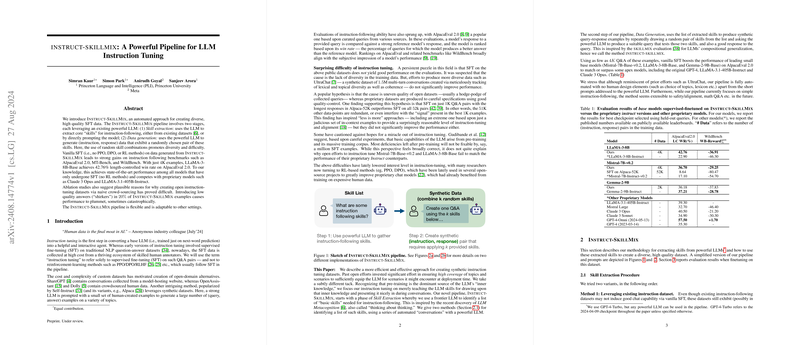An Analysis of the Instruct-SkiLLMix Pipeline for LLM Instruction Tuning
The paper Instruct-SkiLLMix: A Powerful Pipeline for LLM Instruction Tuning, presents a methodological advance in the generation of high-quality supervised fine-tuning (SFT) data for LLMs. The core innovation is the Instruct-SkiLLMix (Instruct-SM) pipeline, which automates the process of data creation to enhance the performance of LLMs on instruction-following tasks. This pipeline is devised in two stages: skill extraction and data generation, utilizing a frontier LLM to ensure high diversity and quality.
Overview of the Methodology
Skill Extraction
The skill extraction stage is executed using two distinct approaches:
- Leveraging Existing Instruction Datasets: Here, the system gleans skills from established datasets like Alpaca-52K and UltraChat. The procedure is inspired by meta-cognitive evaluation techniques, aiming to discern a comprehensive set of instruction-following skills within these datasets.
- Direct Prompting of a Powerful LLM: This involves querying a powerful LLM (e.g., GPT-4-Turbo) to autonomously identify critical skills necessary for high-quality instruction following, focusing on extrapolating diverse skill categories.
From these methods, specific "skill clusters" are identified and subsequently used to direct the generation of new synthetic data.
Data Generation
In the data generation phase, the LLM combines pairs of randomly selected skills to generate (instruction, response) pairs. This approach ensures a rich combinatorial diversity due to the multiplicative nature of the skills' combinations. The generated dataset, referred to as Instruct-SM, is then utilized to fine-tune base models, aiming to enhance their instruction-following performance without the need for further reinforcement learning techniques.
Numerical Results and Performance
The paper reports strong empirical results substantiating the efficacy of the Instruct-SM pipeline. With as few as 4,000 examples, the models achieve competitive performance against state-of-the-art models on benchmarks like AlpacaEval 2.0, MT-Bench, and WildBench.
- AlpacaEval 2.0: A length-controlled win-rate (LC WR) of 42.76% was achieved using the Instruct-SM generated data, which is on par with proprietary models such as Claude 3 Opus and LLaMA-3.1-405B-Instruct.
- MT-Bench: The Instruct-SM pipeline also demonstrated significant improvement on the MT-Bench evaluation.
- WildBench: Instruct-SM data led to outperforming benchmarks like Claude 3 Sonnet and Mistral Large.
Theoretical and Practical Implications
Theoretical Implications:
The success of the Instruct-SM pipeline underscores the critical role of skill specificity and quality in generating effective instruction-following datasets. By focusing on skill extraction and their synthetic combinations, this paper supports the hypothesis that precise, skill-targeted data can significantly improve model performance.
Practical Implications:
The pipeline provides a scalable and efficient methodology for generating high-quality SFT data, essential for tuning base LLMs to high-performance instruction-following models. This approach reduces reliance on costly and labor-intensive human-annotated datasets, presenting an accessible pathway for academic and open-source communities to develop competitive instruction-focused LLMs.
Future Directions
The promising results open up several avenues for future research and development:
- Extending the Instruct-SM pipeline's skill extraction capability to cover more specialized domains, such as mathematical problem solving, alignment, and safety in AI.
- Integrating the Instruct-SM pipeline with reinforcement learning techniques to push the boundaries of instruction-following performance further.
- Exploring the potential of multi-skill interactions beyond pairs to understand composite skill dynamics and their impact on LLM capabilities.
Conclusion
The Instruct-SkiLLMix (Instruct-SM) pipeline offers a powerful and efficient approach for creating diverse, high-quality instruction-following datasets, demonstrating significant performance improvements on established benchmarks. By capitalizing on automated skill extraction and systematic data generation, this research provides valuable insights and tools for advancing the state of LLM fine-tuning practices, potentially reshaping future methodologies in AI training and deployment.
